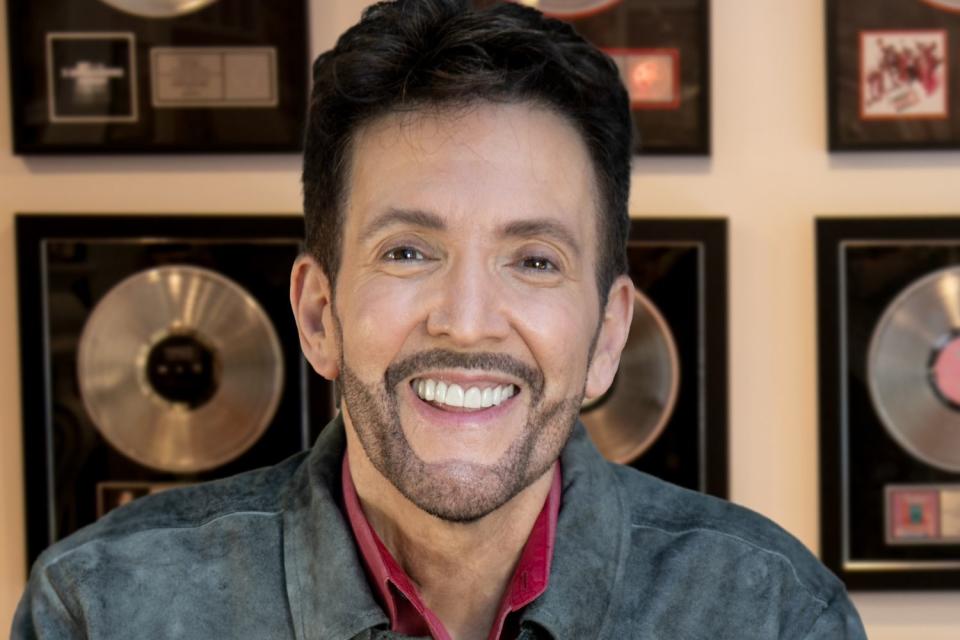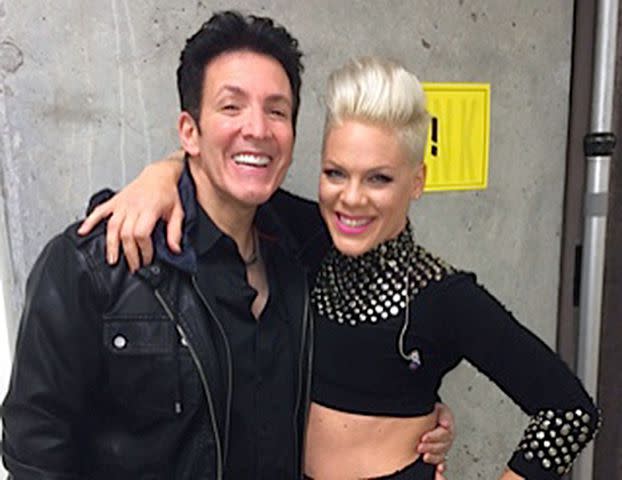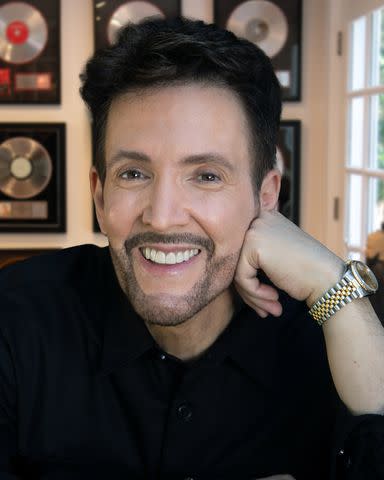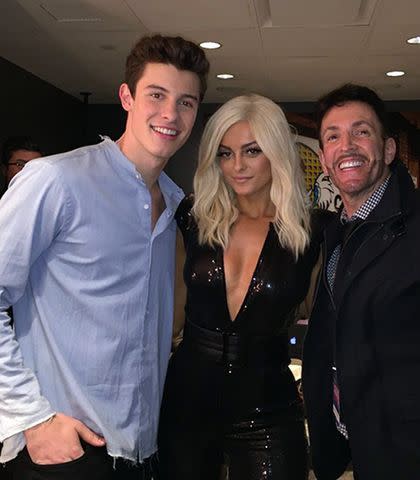Ariana Grande's Vocal Coach Eric Vetro Reveals His Singing Secrets: 'Enhance What You Have' (Exclusive)
The go-to vocal coach for Grande, Camila Cabello, Shawn Mendes, Pink and more tells PEOPLE about his craft and best tips for singers

Courtesy of Eric Vetro
Eric VetroSuperstar musicians like Ariana Grande, Camila Cabello, Shawn Mendes, Rosalía, Katy Perry, Pink, Bebe Rexha and more have all trusted one man with their voices: Eric Vetro.
Ever since childhood, the 67-year-old vocal coach has had a knack for helping talented individuals reach their full potentials, which is why he's become a trusted teacher for both Grammy-winning singers and movie musicals like La La Land, The Little Mermaid and the upcoming Wicked.
"I feel so lucky that I discovered at a really early age something that I love, and I've gotten to do it my whole life," Vetro tells PEOPLE, recalling the moment it all started — when he and a cousin were singing together at around 6 years old.

Courtesy of Eric Vetro
Eric Vetro and Ariana Grande"She was singing 'Jingle Bells' wrong, and I kept drilling her, 'No, it's like this.' I kept making her sing it over and over and over, and she finally got it right," he says. "My same cousin went on to do a few beauty pageants, and I coached her on the songs."
Growing up in upstate New York, Vetro played piano for high school musicals and coached fellow students for their auditions. Teachers recognized his talent early, sometimes excusing him from class to focus on assisting the actors.
"I went to the gym teacher and said, 'My hands are really important right now,' so he excused me from climbing the ropes and doing certain sports where I could hurt my hands because I took it so seriously," he recalls. "If he thought I was just making it up to get out of gym class, he wouldn't have done it, but he believed me."
At home, Vetro didn't initially receive the same level of support. His dad was often driven "crazy" by his constant singing around the house and didn't understand how the passion would turn into a career. "My father was like, 'What are you going to do, teach singing? What kind of job is that?' He couldn't see me going out to work with people in Hollywood," he explains. "But I was compelled to do it."
Vetro doesn't necessarily remember how he started working with celebrities, but some of the stepping stones are clear. While studying at New York University, he made some friends who'd eventually enter the big leagues as well: Grammy-winning songwriter Desmond Child ("I played the piano for his recitals") and casting agent Deborah Aquila, with whom Vetro would later work on La La Land.
After moving to Los Angeles post-college, Vetro met film producers Craig Zaden and Neil Marin (1997's Cinderella starring Brandy and Whitney Houston), who hired him to work on 1999's Annie remake. "Little by little, then they would tell their friends," he says. "Every time you'd work with someone that was a little bit more successful, they would tell someone else, and it just kind of went from there. It feels magical, but trust me, I did work really hard to do a good job."

Courtesy of Eric Vetro
Eric Vetro and PinkEventually, Vetro connected with a teenage Grande ahead of her Broadway debut in 13: The Musical, started working with the young star and became friends with her family, landing his most consistent client to this day. Since then, he's watched her rise to mega-fame as well as clients like Cabello and Mendes, each of whom he's worked with for around a decade.
"I can't say I feel like a parent, but I feel like an uncle," says Vetro of his relationship to the stars. "Watching them get hit records or go on to do other things, like when Camila did Cinderella or Ariana filming Wicked, it's so exciting to me, feeling like I'm a part of helping them make those things happen."
Below, Vetro shares stories from his decades as a vocal coach as well as some of his trade secrets with PEOPLE.
What's the most common vocal issue you work on with clients?
Well, there's several. One would be the transition between your lower voice and your higher voice. Making that transition smooth is really difficult for a lot of people. I spend a lot of time on that, and I feel like I've perfected that really well. A lot of people don't know how to breathe properly. They don't know how to support their voice, and that makes a difference. I also think a lot of people tense up their neck, throat and jaw, and they need to learn how to relax that. Otherwise, you can get hoarse and tired much quicker. I try to simplify it so that people can understand it, digest it, and actually put it into action.
I would imagine that's really important because artists, maybe more than anyone, can be sensitive about their craft.
Really sensitive. A lot of times people will come to me and say, "My last teacher was just too harsh," or, "They made me feel bad about myself." They were probably trying to tear the person down, build them back up and then take credit for that or whatever, but I feel like that's a huge mistake. I come from the school of thinking that encouragement is really important. I'm always very honest, but I realize the right time and place to be honest — with kindness. I always say, "I'm not going to give criticism. I'm going to give you advice."

Courtesy of Eric Vetro
Eric VetroI'm sure your advice has to be tailored to each person, too, because none of their voices are the same.
I really pride myself on being really, really thoughtful in trying to help enhance what is unique and special about them. If someone has a little raspy voice, I say, "Let's go with it, but this is how you have to learn to use it so you don't lose it or or have problems." Or sometimes when someone has a certain accent, I think that's what partly makes them special or unique. I am really cautious trying never to make everyone sound the same. If someone says, "I want to sound like so-and-so," I always say, "Yeah, but we already got that person. Let's really enhance what you have. Let's take your potential and bring it to the highest possible level."
Can you teach anyone to sing correctly, or are there some tone-deaf individuals you've had to discourage?
Well, if someone is truly tone-deaf, I definitely discourage them, but I feel like I can improve anyone. I'll get hired by movie producers to work on films with actors who either have never sung or haven't sung a lot, and I always say, "I can make them sound better than they do now. How much? I can't guarantee. I can't tell you they're going to end up sounding like Ariana Grande, but I can tell you they will sound better."
Actually, there was this really handsome model that came to me a couple of years ago. I really liked him, but I said, "You know what? I don't think you should waste your time and money working in a field that is so competitive when you really don't have the talent that's going to give you a chance at real success. Work on some other things that you could do well." So many people are trying to make it, and if you just don't have any natural ability, it's not going to work. I don't encounter a lot of people with zero talent, but like I said, I've been honest with them when I have.

Courtesy of Eric Vetro
Shawn Mendes, Bebe Rexha and Eric VetroIs there a specific reason you've become the go-to vocal coach for celebrities? Why do you think they feel so comfortable with you?
I've thought about that a lot. I think they can feel that I really like them and want to help them, because I really do. I think a lot of people do jobs that they don't really love or they get tired of doing or whatever, but I never get tired of it. I would rather be here in my music studio giving a voice lesson than be any place else. That's why I don't take vacations. I love doing this, and it probably sounds strange to a lot of people, but that's just the way it is for me. Every time I get a new phone call about somebody new or a new movie, I get excited. I never get jaded.
Also, I never phone it in, and I think that's the key to success. I feel their gratitude, especially actors haven't sung a lot or maybe are a little bit scared of it. They know that I am going to do my very best to make them sound their best. I feel like they trust me, that's what it is, and trust that I will make them sound as good as they could possibly sound. I think they feel that from me.
It also sounds like you're a fan of a lot of the people you work with.
I'm the biggest fan. I mean, no one listens to their music more than I. No one watches their movies more than I. I will watch a movie I've worked on over and over. Just the other night, I was on the treadmill. I was going through all these movies I haven't seen that I should watch, and yet I was drawn to La La Land.
For more People news, make sure to sign up for our newsletter!
Read the original article on People.


